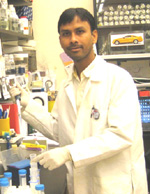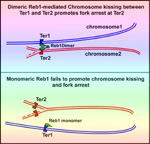|
|
|

|
Kissing concept, DNA featured in science journal
|
 Dr. Samarendra Singh Dr. Samarendra Singh
Kissing concept, DNA featured in science journal The prominent
biological science journal, Cell, featured a paper by MUSC researchers
Samarendra K. Singh, Ph.D., a postdoctoral fellow in the Department of
Biochemistry and Molecular Biology and molecular biologist Deepak
Bastia, Ph.D., Gaylord and Dorothy Donnelley Chair. The paper shared
details about their discovery relating to interactions between
chromosomes, also called chromosome kissing, and their involvement in
regulation of DNA replication.
Previously, gene replication was thought to be controlled exclusively
by regulatory proteins acting on individual chromosomes. This was
essentially a two-dimensional view of this control mechanism. The new
results show that through chromosome kissing, the mechanism of control
of gene duplication is three-dimensional and cooperative. Chromosome
kissing also is responsible for sex determination by turning of one of
the two X-chromosomes in human females and for generating chromosome
translocations associated with cancer.
The findings were featured in the Sept. 17 issue of the journal.
Bastia’s paper in Cell is titled, “Regulation of Replication
Termination in Schizosaccharomyces pombe by Terminator protein-mediated
action at a distance.”
 The
work is the result of many years of study with Bastia and his coworkers
with long-range protein and DNA interactions, which are considered a
universal and key regulatory mechanism that controls all major cellular
activities. The other collaborators in this effort were Susan L.
Forsburg, Ph.D., a professor in the Department of Biological Sciences,
University of Southern California, Los Angeles, and colleague Sarah
Sabatinos, Ph.D., a post doctoral fellow also working in Forsburg’s
lab. The
work is the result of many years of study with Bastia and his coworkers
with long-range protein and DNA interactions, which are considered a
universal and key regulatory mechanism that controls all major cellular
activities. The other collaborators in this effort were Susan L.
Forsburg, Ph.D., a professor in the Department of Biological Sciences,
University of Southern California, Los Angeles, and colleague Sarah
Sabatinos, Ph.D., a post doctoral fellow also working in Forsburg’s
lab.
Lipid specialist Yusuf A. Hannun, M.D., Ralph F. Hirschmann Professor
and Chairman, MUSC Department of Biochemistry and Molecular Biology,
praised his colleague for this accomplishment.
“Dr. Bastia’s work really clinches the work in terms of how it
regulates the termination of DNA replication. This discovery opens the
door to further scientific discovery and opportunities. It’s exciting
that this has opened a big, new chapter, and it’s happening at MUSC,”
said Hannun.
Bastia and his team’s discoveries already have yielded several new and
innovative techniques in helping scientists learn how to look at and
study long-range protein DNA, concept of chromosome capture and other
breakthroughs.
Bastia and Singh plan to continue their research in chromosome kissing
and develop further understandings of proteins in DNA replication.
Bastia received his doctorate from the University of Chicago in 1971.
He worked in other faculty positions at the University of Alabama in
Birmingham and Duke University Medical Center before joining MUSC in
2001. His research interest is focused on understanding the control of
initiation and termination of DNA replication and its relationship to
cancer and cellular aging.
Cell is considered the highest impact, peer-reviewed scientific
journal, which is published bi-monthly. It focuses on research in the
molecular biology, genetics, biochemistry, structural biology and other
areas of contemporary science.
Bastia is the
fourth MUSC faculty-researcher to have a paper published in Cell.
Previous MUSC researchers include E. Carwile LeRoy, M.D., Division of
Rheumatology and Immunology (May 1987); Xiankui Zhang, Ph.D., Division
of Rheumatology and Immunology (March 2000) and Susumu Minamisawa,
Ph.D., Department of Cell Biology and Anatomy (September 2000).
To view the article, visit http://www.cell.com/home.
Friday, Sept. 24, 2010
|
|
|




 The
work is the result of many years of study with Bastia and his coworkers
with long-range protein and DNA interactions, which are considered a
universal and key regulatory mechanism that controls all major cellular
activities. The other collaborators in this effort were Susan L.
Forsburg, Ph.D., a professor in the Department of Biological Sciences,
University of Southern California, Los Angeles, and colleague Sarah
Sabatinos, Ph.D., a post doctoral fellow also working in Forsburg’s
lab.
The
work is the result of many years of study with Bastia and his coworkers
with long-range protein and DNA interactions, which are considered a
universal and key regulatory mechanism that controls all major cellular
activities. The other collaborators in this effort were Susan L.
Forsburg, Ph.D., a professor in the Department of Biological Sciences,
University of Southern California, Los Angeles, and colleague Sarah
Sabatinos, Ph.D., a post doctoral fellow also working in Forsburg’s
lab.